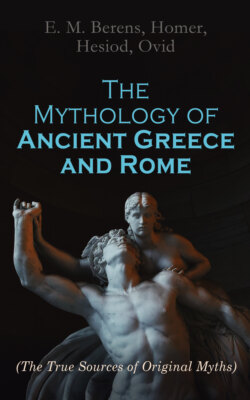Читать книгу The Mythology of Ancient Greece and Rome - Homer - Страница 70
На сайте Литреса книга снята с продажи.
FABLE XI.
ОглавлениеThe Earth, being warmed by the heat of the sun, produces many monsters: among others, the serpent Python, which Apollo kills with his arrows. To establish a memorial of this event, he institutes the Pythian games, and adopts the surname of Pythius.
The Earth of her own accord brought forth other animals of different forms; after that the former moisture was thoroughly heated by the rays of the sun, and the mud and the wet fens fermented with the heat; and the fruitful seeds of things nourished by the enlivening soil, as in the womb of a mother, grew, and, in lapse of time, assumed some regular shape. Thus, when the seven-streamed Nile70 has forsaken the oozy fields, and has returned its waters to their ancient channel, and the fresh mud has been heated with the æthereal sun, the laborers, on turning up the clods, meet with very many animals, and among them, some just begun at the very moment of their formation, and some they see still imperfect, and as yet destitute of some of their limbs; and often, in the same body, is one part animated, the other part is coarse earth. For when moisture and heat have been subjected to a due mixture, they conceive; and all things arise from these two.
And although fire is the antagonist of heat, yet a moist vapor creates all things, and this discordant concord is suited for generation; when, therefore, the Earth, covered with mud by the late deluge, was thoroughly heated by the æthereal sunshine and a penetrating warmth, it produced species of creatures innumerable; and partly restored the former shapes, and partly gave birth to new monsters. She, indeed, might have been unwilling, but then she produced thee as well, thou enormous Python; and thou, unheard-of serpent, wast a source of terror to this new race of men, so vast a part of a mountain didst thou occupy.
The God that bears the bow, and that had never before used such arms, but against the deer and the timorous goats, destroyed him, overwhelmed with a thousand arrows, his quiver being well-nigh exhausted, as the venom oozed forth through the black wounds; and that length of time might not efface the fame of the deed, he instituted sacred games,71 with contests famed in story, called “Pythia,” from the name of the serpent so conquered. In these, whosoever of the young men conquered in boxing, in running, or in chariot-racing, received the honor of a crown of beechen leaves.72 As yet the laurel existed not, and Phœbus used to bind his temples, graceful with long hair, with garlands from any tree.
